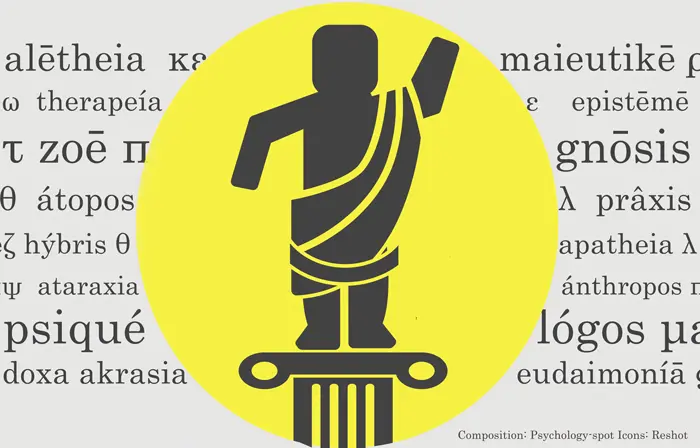
Centuries ago, in the square of Ephesus the most important citizens met to discuss political issues and make decisions about the future of the city. They say that Heraclitus – one of the most lucid philosophers of all time but conveniently forgotten – left the square to retire to the temple of Artemis and play dice with the children.
The Ephesians did not like his decision. They hoped that, if the philosopher retired to the temple, he would go to get lost in deep and sacred thoughts, not to play with the children. When asked for an explanation, Heraclitus replied: “Why are you surprised? Isn’t it better to do this than to take care of the city with you? “
The philosopher, from whom one might expect seriousness, social involvement and depth, not only indulges in a playful activity with the children, but with his words and behavior he calls the “important” activity of his fellow citizens as futile.
In reality, Heraclitus was not moving away from his fellow citizens driven by arrogance, but was moving away from the set of convictions, points of view and traditions that men do not know how to explain but that shape the world of opinion, or using the Greek term, of the doxa.
What is doxa?
Doxa (δόξα) is usually translated as opinion, but in reality it is what seems obvious to us, but deep down we cannot explain, what we are talking about without asking too many questions. It is, for example, those traditions that we follow without understanding their reason for being. Or those opinions that we have made our own, but we cannot substantiate.
Doxa is, therefore, an unfounded interpretation of what happens. They are not the facts or the things in themselves but the discourse that we elaborate from it. It is a veil that we spread over events and things carried out by habit, or simply because it is more comfortable for us to embrace the same opinions as others.
The problem is that we end up confusing that doxa with reality and we give it the pretense of truth. As a result, we end up blinded by the prevailing stream of thought that shapes that doxa.
To get away from the doxa, Heraclitus understands that he must keep a distance from the consolidated certainties of adults and play with children, who still do not have these prejudices, but are used to riddling their interlocutors with an endless chain of “Why? what?”.
Heraclitus thought that a freethinker should assume the search for knowledge with an almost childlike mind, open to everything, which questions everything and makes “why” his banner. However, unlike children, the freethinker is aware of the doxa and does not look for the answers in his parents or in an external authority, but follows a process of personal search.
For this reason, Heraclitus said that “We must not speak and act as children of our parents.” He was referring to our tendency to accept what they tell us, without questioning it, limiting ourselves to repeating old ways of thinking alone. In fact, for the philosopher no tradition, point of view, custom or civil or religious authority has the slightest value if it does not submit to the test of truth, if it does not open to questioning its dogmas.
Religion is, in many ways, the epitome of doxa because it aspires to make believers accept its “truths” on the stroke of faith, which means not reflecting on them. Of course, Heraclitus was not saying that the content of socially shared opinions or ideas is necessarily false. He simply said that many of them are unsubstantiated and do not have an incontrovertible basis to prove them because they have not been subjected to the test of the logos.
Logos, the antidote to doxa
We cannot affirm that we know something just because we have heard it, because common sense imposes it, or because it has been transmitted to us by society or the family. Just because “Things have always been this way” doesn’t mean this way is the correct one.
Heraclitus contrasts the logos with the doxa. Logos is not knowledge, word or thought, as we commonly believe. It is not an immovable truth system. Logos, and the verb leghein, which derives from the root leg, actually means to gather or collect, so it is more of a process than an end result.
Today, we could translate logos as thought, but for ancient philosophers this word was much more than this because it implied the process of discovering the essence of things and phenomena, stripping them of the layers of social interpretations with which they are usually presented to us.
Therefore, logos is to shed light on something, show things as they are in themselves and, of course, base what we believe in. Logos is a path of discovery in which we dare to abandon the certainties and convictions that normally give us security, to question everything and see beyond what the society in which we live shows us.
We only know something when we can show that what we believe is true, when we can explain why with logic and coherence with our own and thoughtful discourse. Everything that we repeat without understanding it moves away from the logos and approaches the doxa. Of these people, Heraclitus said: “They resemble deaf people because they listen without understanding. They do not understand the things they come across, neither having learned them do they know them, but it seems to them that they do”.
Heraclitus’ invitation is clear: it is not convenient to blindly trust that set of norms, values and ways of thinking just because it is shared by a large part of the society or defended by the authority of the moment, but we must think freely to reach our own truth.
Source:
Palazzo, S. (2015) Eraclito e Parmenide: essere e divenire. Milan: Hachette.



